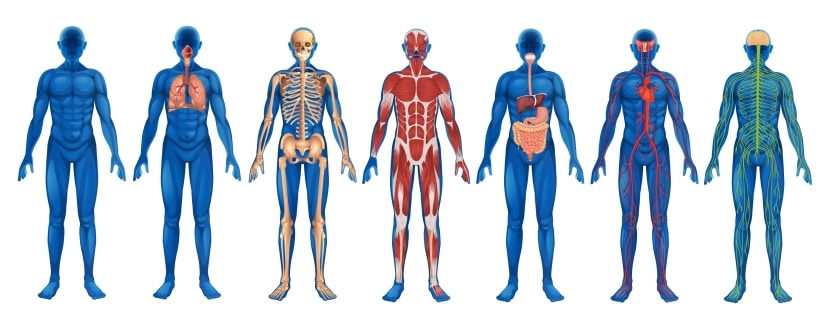Ask the Scientists Introduction to Nutrition

When you learn the basics of nutrition, you give yourself tools you can apply to all of your unique and personal health goals. Unlock your health potential with the Ask the Scientists Introduction to Nutrition.
Welcome to the “Ask the Scientists Introduction to Nutrition” series! Together, we’ll navigate the landscape of nutrients and dietary principles to lay the foundation for a healthier, more vibrant you.
Nutrition is the key to health and wellness. A strong nutritional foundation:
- Ensures basic dietary requirements are met
- Builds up stores of important vitamins and minerals
- Supports the immune system
- Maintains brain health and cognitive function
- Helps preserve heart and lung health
- Supports the body’s defenses from free radicals and oxidative stress
- Helps your body thrive, not just survive
Quality nutrition is one of the best ways to support long-term health. That’s exactly why Ask the Scientists was created. Ask the Scientists was created by a team of scientists from USANA Health Sciences to help extend the company’s core mission beyond the confines of a supplement bottle. We aim to improve quality of life. And we believe health and nutrition education are vital for those who want to achieve optimal wellness. In this guide, we give you the tools you need to make informed decisions that resonate with your personal health goals.
Whether you’re just starting your health and wellness journey or are looking to review the fundamentals, this comprehensive series is designed for all experience levels.
Why Learn Nutrition Basics from Ask the Scientists
There is a ton of nutrition information out there. It can be overwhelming to know where to start. This comprehensive, introductory series was designed to give you a one-stop nutrition resource that you can rely on. Study health and nutrition with us because:
- Expertise You Can Trust: Our series is curated by a team of seasoned scientists and nutrition experts. Backed by over 30 years of experience in cutting-edge research and product development, our contributors bring you credible and up-to-date information to power your health decisions.
- Holistic Approach to Wellness: This series takes a holistic approach, exploring the connections between nutrition, anatomy, chemistry, biology and more. You’ll gain a basic understanding of how each of these fundamentals contribute to health in the body.
- Practical Insights for Healthy Living: As we explore the science of nutrition, we’ll regularly make connections to day-to-day life in the real world. This introductory guide is full of practical tips and strategies that make it simple to adopt healthy habits.
Embark on this educational journey with us and discover the empowering world of nutrition basics. Together, we’ll navigate the landscape of vitamins, minerals, and dietary principles to lay the foundation for a healthier, more vibrant you.
Transform your relationship with nutrition with Ask the Scientists!
1. The Impact of Diet on Health
When you hear the word, “diet”, you might think of calorie-restrictions and the eating fads of past years. But in the world of nutrition, your diet is simply the sum of food that you consume.
Your diet has a profound impact on your physical, mental, and even emotional well-being. The choices you make about the foods you eat significantly affect your health. These choices affect:
- the nutrients your body receives
- the energy levels you have
- your weight
- the health and function of each of your body systems
- long-term health and aging
Unlike fad diets, a healthy eating pattern should feel natural, like something you can enjoy long-term. Consuming a healthy diet is associated with maintaining the health of virtually every part of your body. But the impact of your diet extends beyond just physical health. When you have healthy eating patterns, your relationship with food is positive, your brain functions optimally, and you feel emotionally and mentally capable of handling your day.
So what does a healthy diet look like? Dive into this series of articles to learn about various science-based eating patterns and their impacts on health.
- How Diet Fits Into Overall Holistic Health and Wellness
- How to Eat Based on Science
- Your Diet Impacts Your Mental Health
- Dietary Choices Support Your Health at a Cellular Level
2. The Human Body
The human body is one of the most complex organisms on the planet. It’s made up of billions of microscopic parts, all organized into cells, tissues, organs, and body systems that work together seamlessly for the benefit of the human organism.
Though you’re likely studying this series to improve your nutrition, learning about the human body will benefit many aspects of your life. The knowledge you gain from this module will help you:
- Make healthier choices
- Take appropriate action to maintain your health
- Understand news and scientific developments about nutrition, supplements, and medications
- Be a better parent, caregiver, spouse, or friend
- A better understanding of life on earth
The cell is the basic building block of the body. We’ll start with some background about the different types of cells that make up the body. Then we’ll study each of the body systems to understand their role in the health and function of the body.
- The Human Organism
- The Cells That Make up Your Body
- How Your Body Uses Cell Signaling
- Cardiovascular System
- Respiratory System
- Immune System
- Nervous System
- Lymphatic System
- Liver Health
- Vision and Your Eyes
- Endocrine System
3. Nutrients
The food we eat is like fuel for the body. It contains various nutrients that are essential for life. Without these nutrients from your diet, your body can’t perform the basic functions that keep you going.
Nutrients provide energy, contribute to proteins and body structures, and regulate many biochemical processes. Nutrients can be divided into two broad categories:
Macronutrients
These nutrients make up most of our dietary intake because the body needs them in large quantities. The three types of macronutrients are fats (lipids), carbohydrates, and proteins. One of the main functions of macronutrients is energy production. Carbohydrates are the most efficient energy source, but any of the macronutrients can be converted into energy by the body when needed.
Water is also considered a macronutrient because you need so much of it, but it doesn’t have any calories or provide energy in the way the other macronutrients do.
Micronutrients
Micronutrients are essential for carrying out various bodily functions, but you need them in much smaller amounts compared to the macronutrients. The two classes of micronutrients are vitamins and minerals. While these essential nutrients aren’t a direct energy source in the way macronutrients are, their role as cofactors, enzymes, and catalysts of biochemical processes in the cell makes them just as essential to energy production and life overall.
4. Calories, Energy, and Healthy Weight
Calories are the units of energy derived from the food (macronutrients) we consume. This module explores the principles of thermodynamics, the laws about how energy is utilized, stored, and expended, in the context of the human body.
Discover the relationship between your diet and the metabolic processes in the body that transform your food into energy. This knowledge will help you approach weight management, your diet, and your overall health in an effective, scientific way.
5. Supplements
The conventional wisdom for nutrition is to eat a balanced diet with plenty of vegetables, fruits, healthy fats, and complex carbohydrates. Sounds simple enough, right? The reality however, tells a different story.
In North America, french fries are the top source of vegetables consumed. Fast food and junk food is becoming commonplace, not just in the west, but in countries across the globe. Despite our modern, technological society, various nutritional deficiencies persist in every corner of the world.
In nations where recommended dietary amounts of nutrients are established (RDA), they typically indicate the minimum amounts of nutrients necessary for survival, not the amounts needed for optimal health and wellness.
USANA understands that people don’t eat a perfect diet every single day. We’re only human after all. That’s where supplements come in. When you take a high-quality multivitamin, you’re giving yourself nutritional insurance that can fill any gaps in your day to day eating patterns. On top of providing a strong nutritional base, supplements can support your health in a variety of specific ways.
Explore the scientific research behind nutritional supplements here:
- Long-Term Supplement Research
- Supplement Form: Tablets, Powders, Liquids, and More
- USANA Supplement Research
- USANA Products








